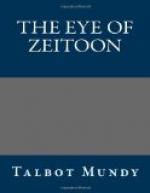Our Zeitoonli Armenians trudged through the mud behind us at a splendid pace—mountain-men with faces toward their hills. The Turks—owners of the animals another man had hired to us—rode perched on top of the loads in stoic silence, changing from mule to mule as the hours passed and watching very carefully that no mule should be overtaxed or chilled. In fact, the first attempt they made to enter into conversation with us was when we dallied to admire a view of Taurus Mountain, and one of them closed up to tell us the mules were catching cold in the wind. (If they had been our animals it might have been another story.)
Their contempt for the Zeitoonli was perfectly illustrated by the difference in situation. They rode; the Armenians walked. Yet the Armenians were less afraid; and when we crossed a swollen ford where a mule caught his forefoot between rocks and was drowning, it was Armenians, not Turks, who plunged into the icy water and worked him free without straining as much as a tendon.
The Turks were obsessed by perpetual fear of robbers. That, and no other motive, made them tolerate the hectoring of Rustum Khan, who had constituted himself officer of transport, and brought up the rear on his superb bay mare. As he had promised us he would, he rode well armed, and the sight of his pistol holsters, the rifle protruding stock-first from a leather case, and his long Rajput saber probably accomplished more than merely keeping Turks in countenance; it prevented them from scattering and bolting home.
His own baggage was packed on two mules in charge of an Armenian boy, who was more afraid of our Turks than they of robbers. Yet, when we demanded of our muleteers what sort of men, and of what nation the dreaded highwaymen might be they pointed at Rustum Khan’s lean servant. At the khan the night before one of them had pointed out to Monty two Circassians and a Kurd as reputed to have a monopoly of robbery on all those roads. Nevertheless, they made the new accusation without blinking.
“All robbers are Armenians—all Armenians are robbers!” they assured us gravely.
When we halted for a meal they refused to eat with our Zeitoonli, although they graciously permitted them to gather all the firewood, and accepted pieces of their pasderma (sun-dried meat) as if that were their due. As soon as they had eaten, and before we had finished, Ibrahim, their grizzled senior, came to us with a new demand. On its face it was not outrageous, because we were doing our own cooking, as any man does who has ever peeped into a Turkish servant’s behind-the-scene arrangements.
“Send those Armenians away!” he urged. “We Turks are worth twice their number!”
“By the beard of God’s prophet!” thundered Rustum Khan, “who gave camp-followers the right to impose advice?”
“They are in league with highwaymen to lead you into a trap!” Ibrahim answered.




